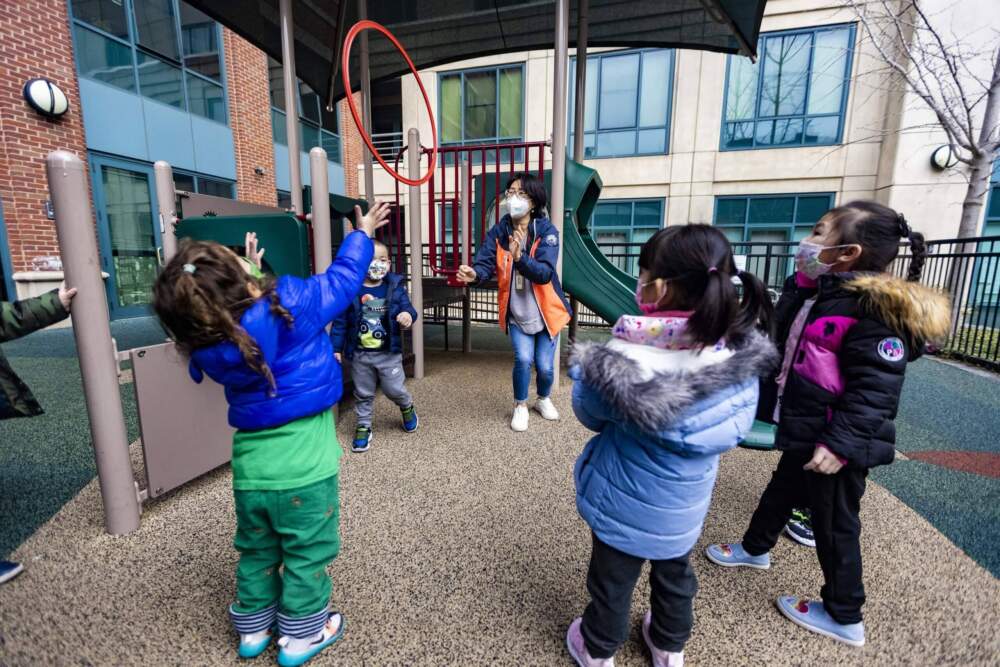Advertisement
Child care sector — essential to Boston’s economy — is struggling to recruit new workers

Boston is feeling the effects of a dwindling early education workforce, compounding problems caused by the lack of spaces providing child care in the region, according to a new city report.
The report, a joint effort by the Boston Opportunity Agenda and the city's Office of Early Childhood, paints a picture of an early education ecosystem that is perilously dependent on underpaid, overworked and aging educators.
Based on 653 survey responses from early childhood educators and directors in 2022, the report finds that young people aren’t filling vacancies in the workforce quickly enough and that wages remain far below a living wage for the region — and don’t necessarily increase with experience.
Nearly half of the survey's respondents worked in Boston, while the rest hailed from other parts of the state.
For an economy that relies on child care outside of the home, that poses a serious structural problem. The Covid-19 pandemic taught policymakers that when child care providers shut down, it tends to keep at least one parent home, too.
The report’s findings were presented on Tuesday at The Boston Foundation. Amy Kershaw, commissioner of the state’s Department of Early Education and Care, said Gov. Maura Healey and others “get that [child care workers] are the workforce behind the workforce… that our economic competitiveness depends on a strong early education and care” system.
So, even as they acknowledged myriad problems, Kershaw and other speakers said they’re more hopeful than ever that large-scale change is possible.
At family child care centers in Boston, more than three-quarters of educators are 45 or older, while more than half of all Boston-based child care centers shed at least 20% of their employees each year, according to the report.
The report also shed light on who those educators are.
Especially in Boston, the survey found, the child care workforce is diverse — except for gender: only 2% of respondents were men. But nearly half of respondents identify as Hispanic or Latino, 30% speak a first language other than English, and nearly a quarter have completed at least some post-baccalaureate higher education.
But 37% of respondents who had left a child care job said they did so due to insufficient wages. Based on data from the Bureau of Labor Statistics from May 2022, child care workers in Massachusetts reported a median annual wage of just $38,840.
The Healey administration hopes to confront the workforce crisis with a multi-pronged response, according to Kershaw, who spoke at Tuesday’s presentation.
Earlier this year, Healey proposed a $114 million investment to expand access to universal preschool, targeted especially at the state’s 26 “Gateway Cities.”
Meanwhile, Kershaw said that her team is focused on the sector’s training “pipeline” by making sure that vocational-technical schools and community colleges offer accessible training in early education; revamping state scholarship programs; and gradually raising wages, thanks to grants to child care providers, known as “C3 grants.”
An April 10 meeting of the state’s board of early education and care will focus on early education workforce-related initiatives, Kershaw added.
For industry experts, the report contained few surprises. Kimberly Lucas, a sociologist at Northeastern University's Policy School who focuses on early education, noted in her closing remarks that she had made “almost identical” findings in her own report on the workforce 15 years ago.
“Turnover in this sector continues to be high, wages remain low, and continue to have limited association with career advancement,” Lucas said. “It’s disheartening to know that we haven’t been able to move the needle much.”
But Lucas said — with child care initiatives underway at the state and municipal level — there’s reason to be hopeful. She encouraged the audience to “turn our ideas into action.”
“Let’s support our workforce in ways that cherish their diversity and enable their well-being,” she said.
